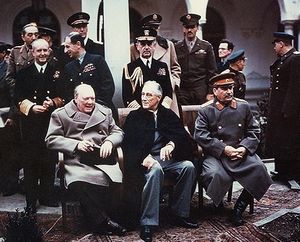Difference between revisions of "Yalta conference"
m (spelling) |
|||
| Line 1: | Line 1: | ||
[[Image:Bigthree.jpg|right|thumb|The "Big Three" at Yalta]] | [[Image:Bigthree.jpg|right|thumb|The "Big Three" at Yalta]] | ||
| − | The '''Yalta Conference''' was the meeting in [[February]] of 1945, the last year of [[World War II]], between [[President]] [[Franklin Roosevelt]], [[Union of Soviet Socialist Republics|Soviet]] Premier [[Joseph Stalin]] and [[Great Britain|British]] [[Prime Minister]] [[Winston Churchill]] (the big three) at Yalta on the | + | The '''Yalta Conference''' was the meeting in [[February]] of 1945, the last year of [[World War II]], between [[President]] [[Franklin Roosevelt]], [[Union of Soviet Socialist Republics|Soviet]] Premier [[Joseph Stalin]] and [[Great Britain|British]] [[Prime Minister]] [[Winston Churchill]] (the big three) at Yalta on the [[Crimea]]n Peninsula in the USSR. It was during this conference that Roosevelt saw a significant decrease in his health. Upon his return to the [[United States]], he soon became very ill and died in April. |
The main agreement of the conference regarded the decision for an unconditional surrender of the [[Nazi]]s. They agreed to divide [[Germany]] into four occupation zones, with [[Berlin]] itself further divided into zones. They also agreed that free elections would be held in Soviet controlled Eastern [[Europe]], but Stalin never had any intention of fulfilling this promise. The USSR also agreed to take part in the war against [[Japan]], though they played a negligible role. | The main agreement of the conference regarded the decision for an unconditional surrender of the [[Nazi]]s. They agreed to divide [[Germany]] into four occupation zones, with [[Berlin]] itself further divided into zones. They also agreed that free elections would be held in Soviet controlled Eastern [[Europe]], but Stalin never had any intention of fulfilling this promise. The USSR also agreed to take part in the war against [[Japan]], though they played a negligible role. | ||
Revision as of 19:47, June 21, 2007
The Yalta Conference was the meeting in February of 1945, the last year of World War II, between President Franklin Roosevelt, Soviet Premier Joseph Stalin and British Prime Minister Winston Churchill (the big three) at Yalta on the Crimean Peninsula in the USSR. It was during this conference that Roosevelt saw a significant decrease in his health. Upon his return to the United States, he soon became very ill and died in April.
The main agreement of the conference regarded the decision for an unconditional surrender of the Nazis. They agreed to divide Germany into four occupation zones, with Berlin itself further divided into zones. They also agreed that free elections would be held in Soviet controlled Eastern Europe, but Stalin never had any intention of fulfilling this promise. The USSR also agreed to take part in the war against Japan, though they played a negligible role.
It was also decided that the League of Nations would be replaced, as it was a failure. Later that year, the United Nations was formed as a result of this agreement. Stalin also agreed to participate in the new United Nations.
Further reading
- The Yalta Betrayal, Felix Wittmer, 1953.
- Agreements Reached at Yalta
- Military History Online
